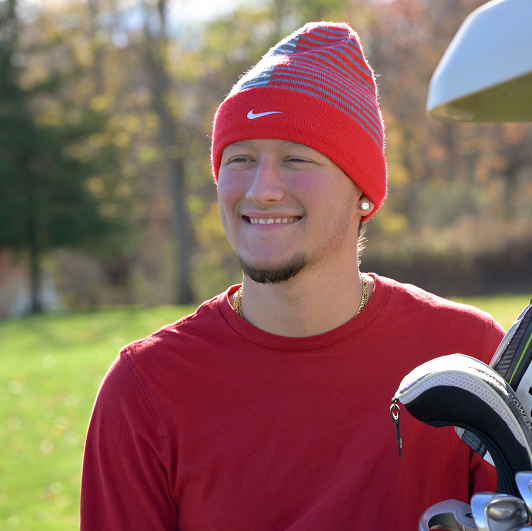Born With Craniosynostosis, Toddler Thrives After Brain Surgery

May 23, 2023
Margaret Lacy and Verdell Wright were understandably terrified to learn that their baby, Marcel, would need intricate surgery to break his skull and place it back together so his brain could grow normally. But the Runnemede, New Jersey, couple found both assurance and unparalleled expertise at K. Hovnanian Children’s Hospital, where doctors were able to perform the procedure in a single step, allowing their rough-and-tumble boy to develop on pace.
Marcel was born in April 2021 with craniosynostosis, a genetic condition that leads the bones in the skull to join together too early. Since skull bones don’t typically fuse until age 2, the abnormality can limit brain growth and lead to intellectual disabilities. Marcel’s unusual subtype, called metopic synostosis, made his forehead appear pointy and his eyes slanted. Approximately one in every 2,500 babies in the United States is born with craniosynostosis, according to the Centers for Disease Control and Prevention.
Before coming to the Hackensack Meridian Children’s Hospital, Margaret and Verdell felt discouraged and dismissed by specialists from other hospital systems, who told them Marcel would require two separate surgeries to repair his skull defect and need to wear a helmet 24/7 for the six months between surgeries. “It didn’t sit right with us,” Margaret recalls. “With major surgery like that, we wanted multiple opinions and needed someone to explain to us what was actually wrong in full detail.”
Comfort and Education
The mothers found exactly who they needed in Lawrence Daniels, M.D., division chief for pediatric neurosurgery and director of the Craniofacial Clinic at K. Hovnanian Children’s Hospital. His no-surprises approach to craniosynostosis treatment involves educating parents with multiple detailed conversations and videos explaining the diagnosis and surgery. Dr. Daniels even connected Margaret and Verdell with other families whose children had the same procedure.
“The goal of my first meeting with families is not to convince or persuade them on one treatment or another. The goal is to inform, educate and comfort,” Dr. Daniels says. “A kinship develops. My patients and their families will be treated like their own neighbors are taking care of them.”
Marcel’s parents were ecstatic to learn that Dr. Daniels and colleagues could indeed perform his surgery in one session rather than two. The single-step procedure—which essentially opened Marcel’s skull and pieced it together again like a puzzle—also “immediately accomplishes what we want, allowing the space needed for the developing brain without delay,” Dr. Daniels says. “We can do the more aggressive and thorough surgery with the same amount of risk or, in many cases, less risk than other surgeons who perform a two-step operation. It really depends on the training and experience of the surgeons, and we have one of the best teams in the world.”
Recovery on Track
Marcel’s surgery took place in October 2021, when he was 7 months old. Though nervous, Margaret and Verdell were put at ease by their rapport with Dr. Daniels and his team, who also arranged to ensure their every comfort, including housing at a local Ronald McDonald House. As expected, the infant wasn’t able to open his eyes just after surgery due to intense swelling, but the baby could hear and respond to his mothers’ voices, which was a tremendous relief and comfort for the family.
Within days, the baby Marcel was sent home, where he quickly resumed his daredevil ways. “We were scared that he might bump his head or fall, but Marcel didn’t care,” Margaret recalls. “He still lunged after his toys. After two days at home, we knew he’d be fine.”
Now 2 years old, Marcel runs boisterously through his home, with a scar so minimal that his parents marvel that he ever had skull surgery. Regular monitoring with Dr. Daniels indicates that he’s recovering and developing normally, and Marcel is already learning the alphabet and how to count.
“He’s a tough little guy,” Dr. Daniels says. “He has grit and spunk, and we love that. The reconstruction we performed was durable enough that you don’t have to treat him any differently than before surgery. That’s the whole reason we did this.”
Q&A: Lawrence Daniels, M.D.

Q: What’s one thing you want patients to know about their health?
The most important thing anyone should know about their health is that health is the most important thing we have. But I think the patient families I work with know that. When you have a family whose child is suffering from something, there’s a clarity we all receive about the importance of what it means to be healthy.
Q: What podcast can’t you get enough of, and why?
I love “Revisionist History” by Malcolm Gladwell. It’s a really geeky podcast about things that aren’t well-known or are misunderstood and covers a variety of topics. It’s so smart and witty. I drive a lot and it gives me something to do in the car that carries my mind away.
Q: What is your routine before bed?
I’m usually working right before bed—I’m something of a workaholic these days. Outside my medical practice, I have a research lab and a biotech company. So typically I’m preparing something or looking over data before bed.
Next Steps & Resources:
With the #1 children's hospitals in New Jersey, according to U.S. News & World Report, our surgical teams treat every child as if they were their own. To learn more about our world-class pediatricians, 200+ pediatric specialists, and extensive surgical programs, visit HackensackMeridianHealth.org/Kids.
- Meet our source: Lawrence Daniels, M.D.
- To make an appointment with a pediatric specialist near you, call 800-822-8905 or visit our website.
- Learn more about Pediatric Craniofacial Surgery or Pediatric Neurosurgery
The material provided through HealthU is intended to be used as general information only and should not replace the advice of your physician. Always consult your physician for individual care.













